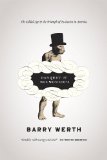Summary | Excerpt | Reviews | Beyond the Book | Readalikes | Genres & Themes | Author Bio
Great Minds, the Gilded Age, and the Triumph of Evolution in America
by Barry Werth

Critics' Opinion:
Readers' Opinion:
First Published:
Jan 2009, 400 pages
Paperback:
Apr 2011, 400 pages
 Book Reviewed by:
Book Reviewed by:
Micah Gell-Redman
Buy This Book
CAMBRIDGE, 1871
Eleven years earlier
What a set of men you have in Cambridge. Both our
universities put together cannot furnish the like. Why
there is Agassiz - he counts for three.
- Charles Darwin to
Henry Wadsworth Longfellow, 1868
Even after he was ousted as the premier naturalist of his age and
the most celebrated man of science in America - even as he suffered,
at age sixty-two, a cerebral hemorrhage that first paralyzed him, then required
him to take to his bed for most of a year, forbidden by his doctors
to smoke his beloved cigars or even to think, either of which they predicted
might kill him - Harvard professor Louis Agassiz never stopped
spinning grand plans or forging ahead with them. Preternaturally ambitious,
a large, vibrant man of murderous industry, deft political skill, and
outsize charm, Agassiz identified himself as no less than a reflection of
the universe, mirroring its magnificence through his ability to observe
and explain the natural world. He also considered himself the herald of
the rapid advance of knowledge in America, his adopted land - an intellectual
high priest for a rising, if still uncertain, world power. And so,
though it had been a year since he’d been all but marginalized on campus
following the selection of a new president, Agassiz remained baldly optimistic
about the future.
How could he not? Other than the risks to his health brought on by
overwork with each new venture, fortune seemed to favor his every step.
The son of a strong-willed assistant pastor to the Protestant congregation
of a lakeside village in French-speaking Switzerland who married well,
he was his parents’ fifth child but the first to survive infancy, and as a student
he displayed a rare surplus of talent, energy, imagination, fearlessness,
and determination. At twenty-nine, an intrepid adventurer studying
glaciers in the Alps, he descended alone at one point 120 feet into a
crystal-blue abyss, and mounted at another a massive section of the
earth’s crust that had vaulted upward to almost fourteen thousand feet.
He was the first scientist to propose that a prehistoric ice age had gripped
the earth, and that extinct giant tropical quadrupeds such as mastodons
had been wiped out by a worldwide Siberian freeze. "Their reign was
over," he announced. "A sudden intense winter, that was also to last for
ages, fell upon our globe."
In an early triumph of paleontology, Agassiz conducted a comprehensive
study of every fossil fish in every major collection on the Continent,
establishing himself as a tireless investigator and winning him favor with
two of Europe’s most influential naturalists, who delighted in opening
doors for him. His bonhomie and good luck were inexhaustible: when his
first wife, upset over his obsessive work habits and troubled finances, left
him (she later died of tuberculosis), he took off to lecture in America,
where Harvard promptly created a scientific school for him and where
he married the daughter of a wealthy lawyer, a pillar of New England
society.
Yet what most distinguished Agassiz’s career was his superiority at getting
others - not just important individuals and adoring audiences, but
institutions and, ultimately, governments - to adopt his outlook and objectives.
Less than a decade after he arrived in America in 1846, outsiders
began referring to the famous Saturday Club as "Agassiz’s Club." During
the Civil War, he and his so-called Scientific Lazzaroni, a close network
self-mockingly named for Florentine beggars, created a national scientific
enterprise with themselves in charge, soliciting Congress to found the
National Academy of Sciences. Dominated by Agassiz and his allies, it
would serve as an equivalent of the French Academy, providing government
subsidies, publications, and other spurs to selected research.
Excerpted from Banquet at Delmonico's by Barry Werth. Copyright © 2009 by Barry Werth. Excerpted by permission of Random House, a division of Random House, Inc. All rights reserved. No part of this excerpt may be reproduced or reprinted without permission in writing from the publisher.





The Funeral Cryer by Wenyan Lu
Debut novelist Wenyan Lu brings us this witty yet profound story about one woman's midlife reawakening in contemporary rural China.
Your guide toexceptional books
BookBrowse seeks out and recommends the best in contemporary fiction and nonfiction—books that not only engage and entertain but also deepen our understanding of ourselves and the world around us.